When I was growing up, some cruel kids with too much knowledge or big ears to eavesdrop on grownup’s conversations would be talking about some girl or boy that was a “tracie” (Kasie lingo for neither man nor woman) and they would insist that s/he had both sex organs. At this stage in our lives, we just assumed that any openly gay person was a “tracie”. This would obviously spark a debate on how credible the source of information is, and we would all agree to label the source “a liar with an overzealous imagination” therefore his tale an urban legend.
Now (05/02/2008), Oprah has guests on her show to tell us about being and living the life of a hermaphrodite. Now the preferred word is intersex as hermaphrodite is considered offensive. As Oprah set the scene, my overactive imagination was seeing all those poor kids, usually girls that just looked a little masculine being labeled and almost tortured to show their “thingys”. Oprah announced that 1 in 2000 children are born with the condition and Intersex is a term used to describe about 30 conditions.
Oprah’s book club had been covering the book,
Middlesex by Jeffrey Eugenides, which I now need a copy of to sink my eyes into, about the life of an intersex person. The book is centered around a character that is born with both sexual organs, lives as a girl and then in puberty decides to live as a man. Anyways, Oprah’s curiosity after reading the book persuaded her to have a show; meet and discuss with real-life intersex people.
First true-Oprah style guest, Katie - a medical student, discovered when she was 6 after a hernia operation that she did not have ovaries, cervix or fallopian tubes but testes. As the doctors were performing the surgery they found testes where her ovaries should have been. She was diagnosed with an intersex condition Androgen Insensitivity Syndrome. Katie was supposed to be a boy but instead of 2 X chromosomes, she had an X and Y combination so her body did not react to the hormones that would ensure she became a boy and she was born with female sex organs; a vagina and no uterus. Ok, bear with me here! I am not a scientist and am just repeating what I saw and heard on Oprah’s show.
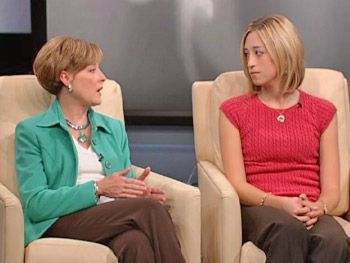 Katie and her mom, Arlene
Katie and her mom, ArleneHer parents had to break the news to her, at 6, and explain the birds and the bees in a whole different outlook. Her mother, Arlene, explained how they had to use age appropriate language around her to explain her condition and what it meant for her in the future. It must heart-wrenching having to explain to your 6 year old that she will never be the same as other girls. Arlene made it sound so simple but I think it was really hard.
At 14, Katie had to start taking Oestregen pills so she can physically develop like other girls – get breasts. Katie would obviously not be able to have children or get menstrual cycles. She found puberty very hard because all her friends were going through all these changes (and buying bras) and her body wasn’t. She explained that she felt isolated during these times because other girls would be dating, parents fiddling around awkwardly and she just couldn’t be a part of it. When she turned 18, she had the testes removed and joined a support group for people with her condition. This helped a lot, as she was surrounded by people who understood her feelings and what she was going through.
I wondered how Katie had the strength to come on the show and share here story with millions of people around the world and letting them in to her personal space. But then, I realized that she had done nothing wrong – genetics had played a dirty game on her and she had not chosen this life. She is a brave woman that just wants to live her life as normally as possible and not be judged for what her genes did to her. Her answer, when Oprah asked, was she needed to educate people, allow women that are affected to be able to speak easier about their conditions and lift the shame and secrecy.
Katie did, and does, find dating a challenge, I can only imagine. Even when you are in the early stages of a relationship revealing something in your past that may impact your new relationship is hard enough; how the hell do you tell a prospective lover about this? She has had 3 boyfriends that did not really care much; but her current one is “amazing” and had simply asked “Ok, so when can we go to dinner?” when she told him about her condition.
The second true Oprah-style guest, Hida, was born with a vagina and an oversized clitoris that resembles a small penis. She is biologically female (2 X Chromosomes) but her body produces extensive amounts of testosterone – which gives her a masculine trait. Her father is a doctor from Colombia, understandably more informed than other parents refused suggestions of surgery when she was a baby. He felt that if everything is functioning properly why cut her open? She, however, only discovered when she was 27, in a magazine, about her condition – her parents had never said a word about it!
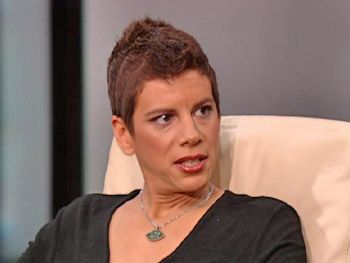 Hida
Hida She grew up more aggressive and competitive like boys, and she was more a tomboy like non-intersex girls. She may have identified with boys but she never wanted to be a boy, she described how she would feel different in the girl’s locker room at school – and she wondered why their privates were so flat and she had an erection. Sho! She admits to looking and feeling “more male” or “more female” at different times.
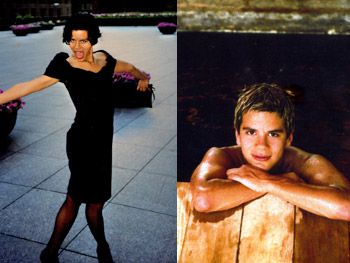 Hda, in her different fe/male looks
Hda, in her different fe/male looksShe feels very happy to be intersex and that her parents did not operate or give her hormone therapy and she wouldn’t change a thing. She describes herself as both – neither female nor male and will not choose a gender. She feels society forces people to choose sides – bi-racial children always have to be asked which race they identify with. She loves her life and is glad no-one did any surgery on her as a child. Amazing!
Lynnell (formerly Steve), third Oprah-style guest was born with the X and Y chromosomes of a male, but with hypospadias—a condition in which the penis is not connected to the urethra—and a vagina-like opening. When she was 2 days old, the doctors sewed up the vagina (there was no canal) and declared her a boy; and she was raised a boy. However, she felt like a girl and was more inclined to play with dolls and skipping rope than with “boy toys” and she was hectically teased and bullied.
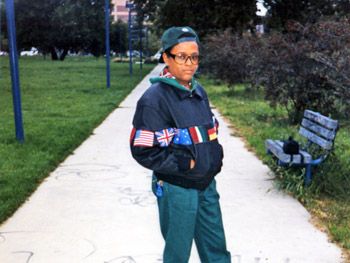 Lynell, as Steve
Lynell, as SteveShe felt like a woman trapped in a man’s body and she looked very girly. In puberty, she developed breasts. Her mother insisted she was a boy but her body was developing otherwise. She decided to live like guy and even got married for a year. She wanted to be someone’s husband, a father – the wife had a child from a previous relationship - but it did not work. She went through a rough time of drugs and alcohol and she felt like she wasn’t living. She decided she has lived a lie long enough so she quit living as Steve and now she lives as a woman!
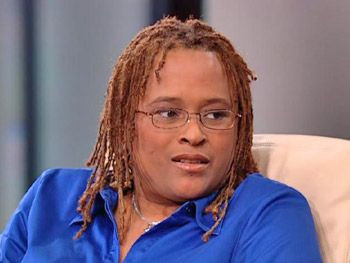 Lynnell
LynnellWhat would an Oprah show without an expert? A Felicia Show! Ok, So Oprah brought Dr Alice Dreger, an expert on the different intersex conditions to advise parents on how to deal with the issue should you have a child born with any of the conditions. She first clears up gender – I was too emotionally drained to type my feelings and opinions on Dr Dreger’s advise so I did a bit of plagiarism, reasoning that this is biological advise that cannot be misinterpreted and would be socially unacceptable and irresponsible to try to rewrite medical advice in my words (I apologize) – The below insert is from
www.oprah.com on the show details.
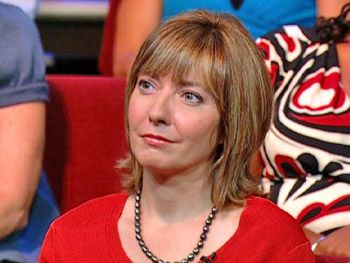 Dr Alice Dreger
Dr Alice Dreger
"There's issues of sex, which is biology—that's male and female and intersex. Then there's gender, which is boy and girl, and sometimes people switch that. And then there's sexual orientation, which is something else in addition—that's whether or not we're attracted to males or to females or to both."
Dr. Dreger stresses that intersex is different from transgender. "Transgender is about a gender identity. And so when somebody is born, everybody gets a gender assignment. Even kids who are intersex get a gender assignment as boy or as girl. What transgender is, is when you feel the assignment you got was the wrong one. So when you grow up later on and you say, 'You know, they said I was a girl but I'm really a boy,' or vice versa."
What should parents do if their child is born intersex?
Dr. Dreger says first it's important that they work with experienced doctors to come up with a gender assignment that considers the child's medical issues and does not require surgery unless it is medically necessary. Then parents should raise the child with that assigned gender. Then, parents of intersex children should seek out support groups, like the one that helped Katie and her family. "Being able to meet somebody else like you, another parent of a child who has intersex, is really lifesaving in a lot of ways," she says. "Work with the professionals, but you also recognize there's some stuff the professionals can't do for you that another human being can."
Dr. Dreger says that doctors who perform surgery on children born with intersex conditions are doing so out of "charitable feeling," thinking they will ease suffering. "They're doing it out of a really good place in terms of their attitude," she says. "The problem is that [unnecessary surgery] is not, I don't think, the best way to intervene."
"The doctors have good intentions, but they are speculating," Hida says. "I feel blessed. I would not be a quote-unquote regular woman if you paid me."
In general, we all can try to be more accepting of intersex individuals. "Many times in our society people get locked into wanting people to just be the way they are," Oprah says. "But I really do think that in order for our human species to be able to continue to evolve, that we have to be able to accept all people."